Close UP
Nonprofit Organization CWS Japan ~From Coexistence to Living Together. Creating communities that do not create "vulnerable people during disasters" who are isolated and unable to receive support in times of disaster.~

CWS Japan supports people affected by natural disasters, poverty, and conflicts in Japan as well as overseas. One of their activities is the Multicultural x Disaster Risk Reduction Project. CWS Japan has had an office in Shinjuku City, Tokyo, since 2011. They conducted surveys on support for foreigners in the Shinjuku area in 2020. The survey is reflected in CWS Japan's counseling sessions for foreigners, disaster preparedness workshops at Japanese language schools, and while hosting the Community Cafe. In this way, they have focused on building community relationships that do not create disaster-vulnerable groups.
The impetus for CWS Japan to launch the Multicultural X Disaster Reduction Project came from a realization while CWS Japan was providing disaster emergency assistance. We interviewed Ms. Yukiko Maki, who is in charge of the project.
Vulnerable victims of disasters who cannot speak out and are left without support as "invisible people".
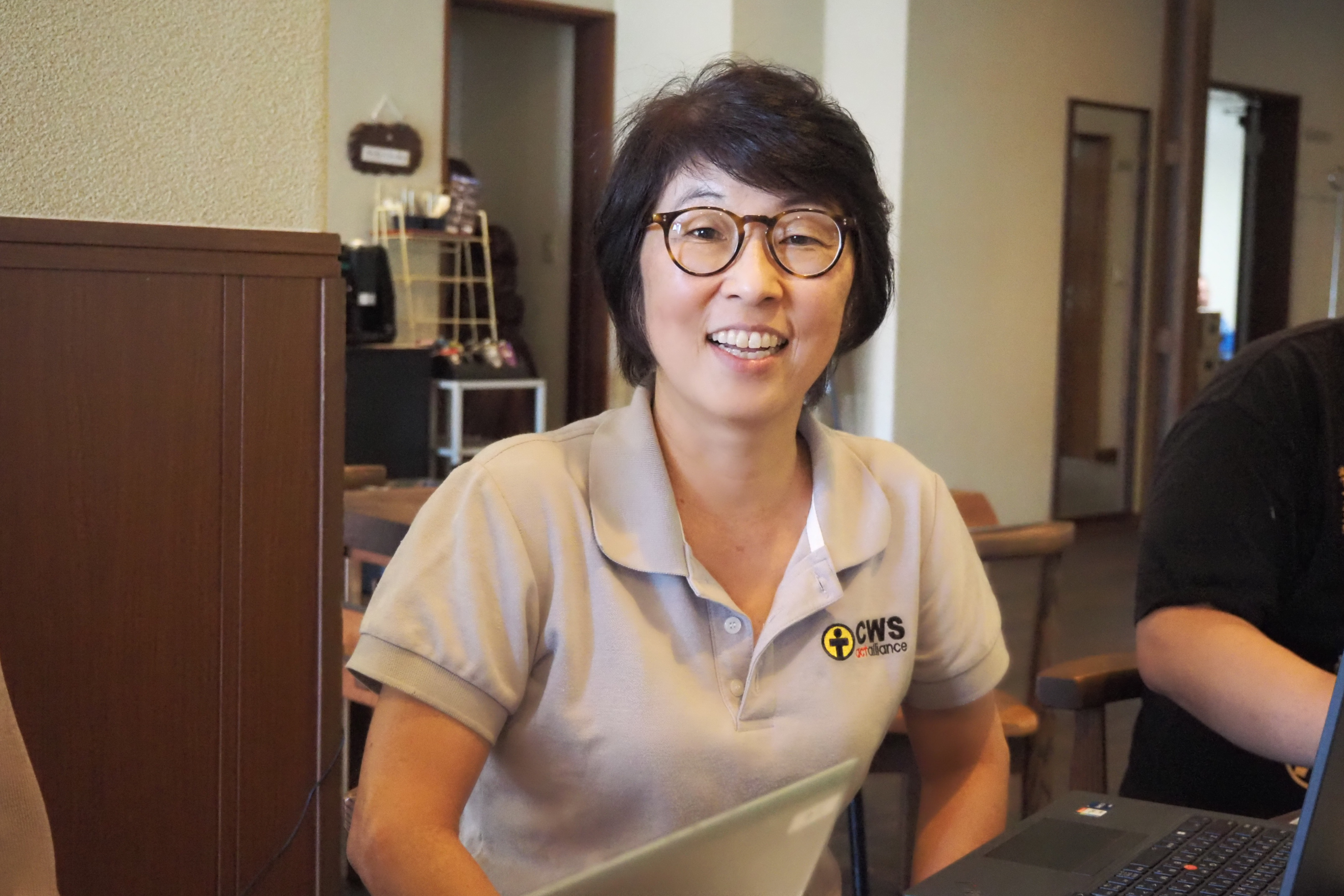
CWS Japan has been providing disaster response and disaster preparedness support at various sites in Japan and abroad, aiming for "a society where no one is left behind in the event of a disaster". Through CWS Japan's past emergency disaster relief activities, Ms. Maki has come to realize something.
"In the event of a disaster, requests for assistance are sent to the Social Welfare Councils in the area. The Social Welfare Council then dispatches volunteers to each home and other locations. Although it should be the same for impoverished and foreign nationals who were suffering from disasters, I wondered why (we) did not meet those most vulnerable households in the field."
Many organizations partner with administrative offices and the local Social Welfare Councils to provide support. However, Ms. Maki hypothesized that those who are not connected to the administration and those who are not able to send out SOSs may be isolated from the local community as "invisible people". Working with local support groups, Ms. Maki was finally able to meet foreign nationals and mentally disabled disaster victims. This event also led to an awareness of the issues involved.
"The disaster has revealed those who are 'invisible' and unable to speak out as vulnerable disaster victims. We suspected that even before disaster struck, these people had been vulnerable and isolated in their local communities. Therefore, we, CWS Japan, suggested that we should focus on people who might be left out of support as 'invisible' and vulnerable to disasters, usually," says Ms. Maki.
Foreigners tend to be vulnerable to disasters. Many of them do not even know where the evacuation shelters are.
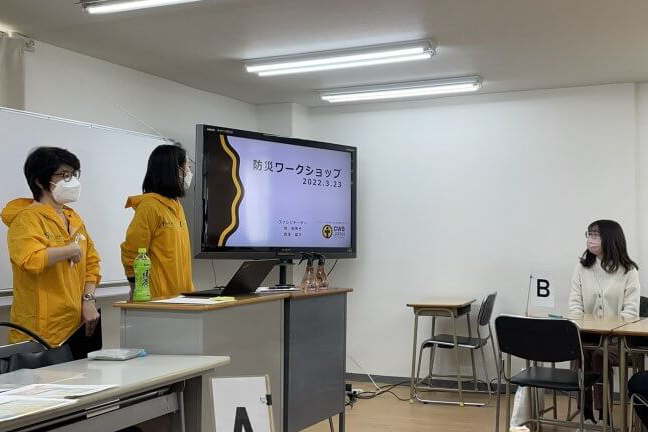
🄫CWS Japan
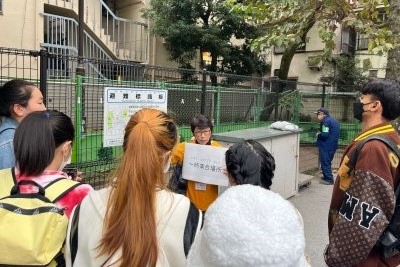
🄫CWS Japan
Ms. Maki believes that foreigners are one example of the "invisible people" who could become vulnerable to disasters and should be focused on.
Shinjuku City, where CWS Japan has its office, has one of the largest populations of foreign residents in Japan. In FY2020, as a means of reaffirming their belonging to Shinjuku City, CWS Japan conducted a survey project focusing on Shinjuku City to support foreigners in the event of a disaster; "Aiming for a Resilient Multicultural Community in Shinjuku City where No One is Left Behind". Due to the COVID-19 pandemic, surveys and interviews with foreign residents were conducted via the Internet. The surveys revealed that while 70% of the foreign residents who responded to the surveys were prepared with emergency supplies, water, and food, nearly 80% of them did not know the location of evacuation shelters. Some did not understand the characteristics and risks of earthquakes in Japan, because their home countries do not have earthquakes.
Based on the results of these surveys, Ms. Maki visited Japanese language schools and local Japanese language classes to hold disaster preparedness workshops. She explained the difference between evacuation shelters and emergency evacuation sites, about temporary accommodation facilities, and about how to operate a shelter.
"The survey results showed that many foreigners did not know where evacuation shelters were located. But when asked where they would like to evacuate, the majority said 'evacuation shelters'. In Shinjuku City, you must fill out a registration card at shelters, but it is all in Japanese. Also, (on a registration card) there is a section to write about a neighborhood association to which you belong, but many foreigners did not know what a neighborhood association was, and to which neighborhood association their family belonged," says Ms. Maki. In order to raise disaster awareness among foreign residents, Ms. Maki participates in local disaster drills with foreign residents, and also conducts the Multicultural x Disaster Risk Reduction Town Walk, walking around the Okubo district with foreigners to check evacuation centers and evacuation routes.
Aiming to build community relationships from ordinary times in order to make "mutual aid" function in the event of an emergency.
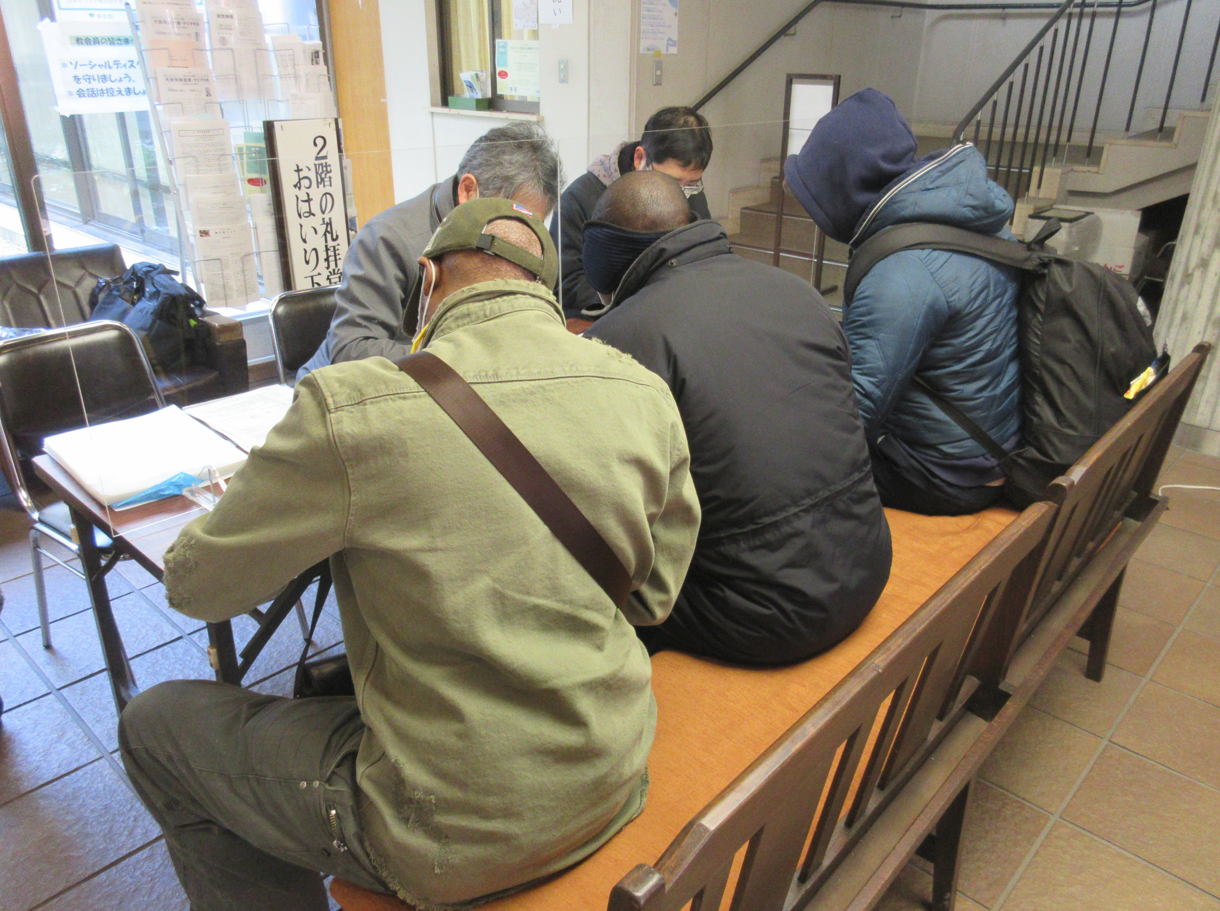
🄫CWS Japan
"In Shinjuku City, (Japanese residents) coexist with many foreigners, but we feel that they have not yet lived together in harmony. When we see foreign nationals that we involved with, they hardly have any community connections or interactions. Especially since shelter-in-place (sheltering in your own home) tends to be encouraged in times of disaster these days, it is even harder to spot foreign residents. It is too late to look for people who need help or are vulnerable once a disaster occurs, so I thought it was necessary to build relationships on a regular basis," says Ms. Maki. Therefore, in 2021, CWS Japan held free counseling sessions and distributed daily commodities in the Okubo district, where many foreigners live, work, or go to school in Shinjuku City. The goal was to identify foreign residents in Shinjuku City who were having difficulties in their daily lives, and to connect them with communities and assistance in order to prevent their isolation; as well as to raise awareness of the existence of supporters and support centers.
Furthermore, CWS Japan started Community Cafe @Okubo in 2023 with the concept of "Creating a place for a multicultural and multigenerational society, for adults". The Okubo area is home to many young foreign students who move frequently, as well as refugees and immigrants who have unstable status and positions. CWS Japan has learned through its past activities that these people live with little or no connection to the local community. CWS Japan says that it has come to host the Community Cafe as a place for these people to meet and connect with Japanese people in their community. CWS Japan aims to create a community based on Community Cafe @Okubo, where people can watch over each other and help each other.
"In the 1995 Great Hanshin-Awaji Earthquake, statistics show that 97.5% of the victims were rescued by mutual aid among residents. We strongly feel that for mutual aid to function in such a situation, it is important to build community relationships on a daily basis."
Connecting Through Japanese Language Learning Support, and Leading to Community Participation and Disaster Preparedness Awareness
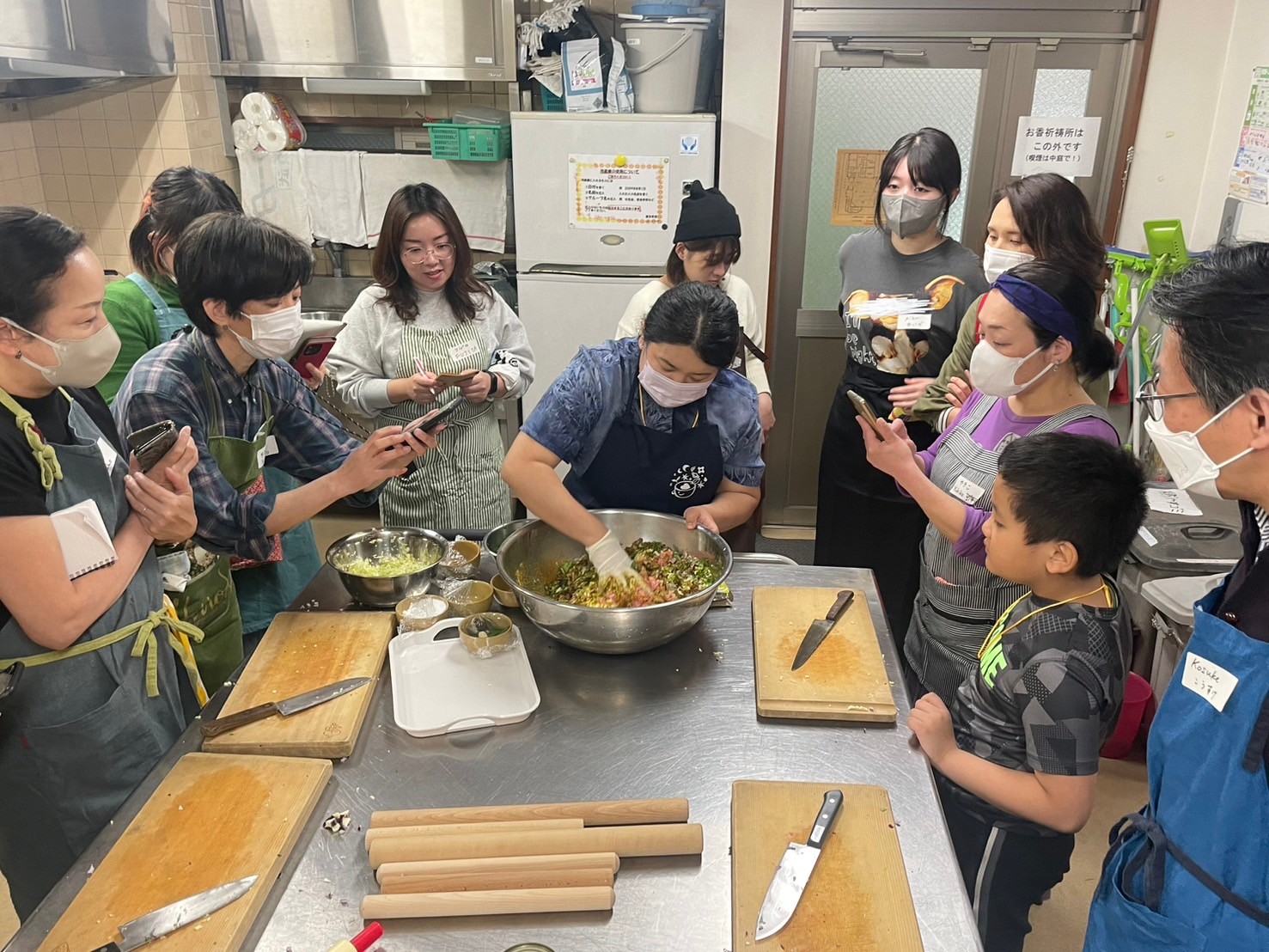
🄫CWS Japan
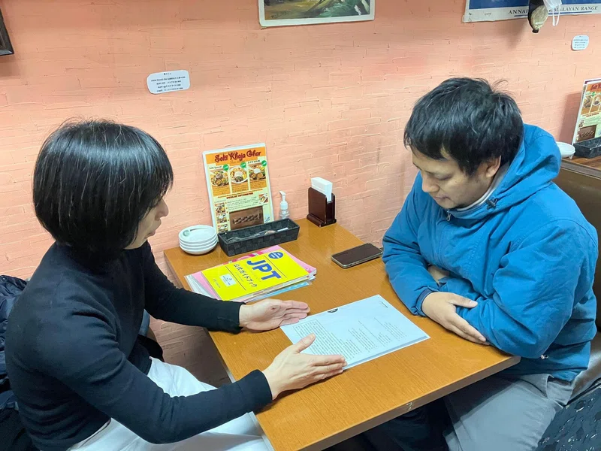
🄫CWS Japan
The Community Cafe is held twice a month. A variety of activities are offered, including performances by musicians, craft experiences, choral singing, cooking classes, and more. The Community Cafe also offers Japanese language study support. In addition to the classes held at the Community Cafe, CWS Japan also offers on-site lessons for foreign employees of local stores.
"Many foreigners do not feel the need to learn Japanese because they can somehow live in the Okubo area even if they do not speak it. However, it may be necessary for them (to speak) Japanese to participate in the local community, to send out an SOS in case of emergency, and to help each other."
Japanese language lessons are conducted on a one-to-one basis. During class hours from 2:00 p.m. to 8:00 p.m., students and learning supporters (instructors) are frequently interchanged, and learning proceeds according to the needs and level of each student. Each of the stores where CWS Japan conducts its on-site classes is a gathering places for Nepalese and Bangladeshi people. When lessons are held at stores, many people are interested in what is going on there. Sometimes CWS Japan can provide Japanese language study support and lifestyle counseling to people who have approached them in this way.
"We decided to go out to them because we knew that foreigners would not come to us if we just waited in the classroom. As a result, we have been able to connect with people who happen to visit stores, and we have also been able to expand our relationships with the foreign community, by gradually joining them through Japanese language study and daily life support."
CWS Japan's first goal is to achieve a level where foreign residents can send out an SOS on their own in the event of a disaster, communicate in basic Japanese at evacuation centers, and receive public assistance. They hope to gradually raise awareness of disaster prevention through Japanese language study.
From the "being helped" side to the "helping" side.
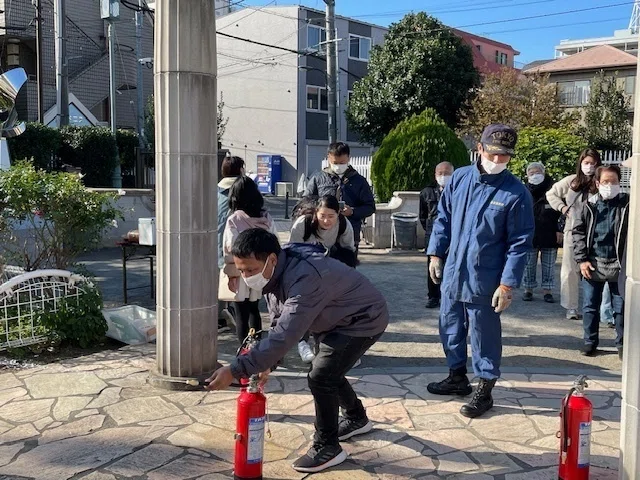
🄫CWS Japan
Ms. Maki says that, while conducting the project, she is aware of the difficulties in the Okubo area.
"The Okubo area has a multinational population, a large number of young people who are moving in and out frequently, a lack of interaction between Japanese and foreigners, an aging residents’ association, a large number of single elderly people, a huge commercial district, and a geographical location that makes it difficult to secure evacuation routes. We consider (Okubo) to be an area with various geographical and regional difficulties."
Aging is not only a problem for Japanese people; the number of elderly foreign people has been increasing in recent years. In particular, there are many elderly foreign people who do not understand Japanese, and even those who speak Japanese may only be able to speak their native language when they develop dementia. Ms. Maki is concerned that elderly foreign people who do not speak Japanese may be the most vulnerable to disasters.
With this in mind, CWS Japan is also conscious of a multicultural and multigenerational society in the activities of the Community Cafe. They focus on making connections with care facilities that have foreign national users. CWS Japan also work with local support groups to address this issue together with local residents, by holding welfare cafe where they consider elderly foreign people and disaster preparedness. In the event of a disaster, they aim to strengthen support for elderly foreign people by collaborating with local business establishments and support groups.
On the other hand, Ms. Maki says she also sees potential in the Okubo area.
"According to the Basic Resident Register, approximately 13% of the population of Shinjuku City consists of foreign residents, of which 89.9% are considered productive population. We believe that foreign residents, who may be vulnerable to disasters at this point, can be on the side of disaster relief as bearers of community disaster preparedness, rather than recipients; if they acquire Japanese language skills and knowledge of disaster preparedness. For this reason, I strongly feel that it is important to build community relationships on a daily basis."
Based on the Community Cafe, which has been open for one year, the safety net for disaster preparedness in the Okubo area is gradually expanding.
